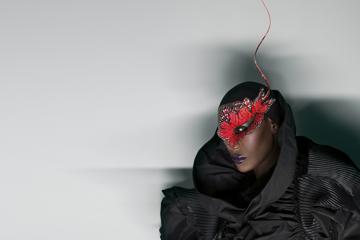True Punk Soul Rebel
"I want to be a part of the community, but I don’t want the pressure. I still have problems, I’m still a fucked-up person."

“I don't want that responsibility,” Against Me! vocalist Laura Jane Grace says being a transgender icon. “I want to be a part of the community, but I don't want the pressure. I still have problems, I'm still a fucked-up person. I still have demons that I deal with. I still go to psychotherapy, and my psychotherapist has this saying – 'just because you're diagnosed with cancer does not mean you're an expert on cancer'.”
While she is first to admit that she's no expert, countless interviews since she came out have zeroed in on all aspects of her transition, hoping to catch a glimpse of the new real Laura. For someone who's bared her soul to people all over the world through her music, digging through a closet seems superfluous.
“I realise that for some people this will be their first or only exposure to [trans* people] and I want to give answers that will make them more informed as a person. I'm doing what I can. But me at my most personal, sharing my most personal thoughts, is what I do in songs. Letting someone look through my closet, or something like that, doesn't really compare to pouring my heart out in a song.”
Transgender Dysphoria Blues features an incredibly open and candid list of songs that tell a more detailed and honest story of the tormented artist than any journalist ever could. “I reached a point of frustration in the past where I was sharing things and saying things that were being taken in the wrong way because I was being perceived as someone that I'm not,” says Grace on the shift in focus for the new record. “To have something taken in the proper context and to feel like you don't have to censor yourself at all is a really liberating thing as a writer, as a lyricist.”
Don't miss a beat with our FREE daily newsletter

With a certain punk-rock elegance, the new album plays like both a homage to Against Me!'s roots, as well as showing considerable growth in Grace's approach to songwriting. It is most definitely not just a record for trans* people, a fact that she wants to make clear.
“I know the record may seem really overt in talking about issues like being trans*, but I think deep down a lot of the things being talked about on the record are really universal things: depression, isolation, not being happy with the person you are, drug addiction, alcoholism… For me, the trick was to put what I was feeling in a context were people could still relate to it and it wasn't just directed towards people who are trans*.”
Against Me! have not left behind their characteristic folk twang either, and songs like Unconditional Love saunter out in that classic country guitar tone and walking bassline. There are the fast and raw garage punk songs (Drinking With The Jocks), there are the soaring rock ballads and singalong choruses (True Trans Soul Rebel), and belted out on top of it all is Grace's explosive voice: angry and present and more powerful than ever before.
“A lot of the changes that have happened with my voice since I started playing in Against Me!, when I was 17, have really been out of my control, and have happened from doing 200+ shows a year screaming your fucking head off,” explains Grace, laughing off my compliment. “I had to spend a lot of time with a capo, trying to find the right key for me. I used to sing a lot in that lower register, and I couldn't get the emotion that I wanted out of it. I have to get the right key, the right amount of push, but where it's not too hard so you can do it night after night on tour.”
The songs are visceral on Transgender Dysphoria Blues, and an immense level of frustration and pain bleeds through Grace's lyrics. The provocatively titled Osama Bin Laden As The Crucified Christ deals with the harsh realities facing many trans* folk – self-hate and self-harm – growled out over a gravel-rash bass riff unlike anything heard on previous Against Me! records.
“The full band version kind of has this weird LA cock-rock vibe, in that weird way with the guitar solo. Our point of reference when we were recording it was always like 'Ok, does it make you want take a bong hit?' then we'd know it's there,” she quips. “For me that song is about the fact that life is based on perspectives; some people worshipped the very ground Osama bin Laden walked on, it's all about perspective. We're all as guilty in the world as everyone else, in the end we're all gonna hang, we're all gonna die.”
Trans* narratives often have common threads, and Grace and I do share a lot of common experiences; the years spent dressing up in women's clothes, the substance abuse, the binge and the purge. But no two trans* people will have the same lived experiences. Yet the themes of uncertainty and fear, of not only rejection but also constant misunderstanding, and the pain and anger on Transgender Dysphoria Blues resonate strongly with many of my own experiences with gender dysphoria. When Grace sings on the track True Trans Soul Rebel, “Once you were born, you were already dead / You sleep with a gun beside you in bed / You follow through to the obvious end / See your veins wide open / You bleed it out”, I can see the reflection of my face in the mirror; bruised eyes and bleeding knuckles from hammering my fist against my head with the deranged notion that I could somehow beat the thoughts about my body out. I can see my feet hanging over the edge of Statham Quarry, over the edge of Kangaroo Point.

This is the very real decision that many trans* people make on a day-to-day basis; the choice to 'follow through to the obvious end' of their self-hate, or the choice to embrace who they are on the inside and push it out into the world. For Grace, this choice was the main inspiration behind the album. “The majority of the songs on the record where written before I came out. It's about reaching that point for me where I decided to transition; that point of complete abandon where nothing fucking matters. Like fuck it, this isn't about being brave this is only about surviving. I'm either gonna kill myself, or I'm gonna do this.”
Coming out isn't a panacea to dysphoria, and Grace explores this in the song Fuckmylife666. Despite its upbeat groove, the lyrics are some of the deepest and most cutting on the record, focusing on Grace questioning whether she'll ever be beautiful or sexual now, and struggling to manage her dysphoria and her relationship with her wife, Heather.
“It's definitely dysphoria-inducing; transitioning around someone who is really beautiful, it adds an element of difficulty. Fuckmylife666 was written back in July, and it's directly about my relationship with Heather and just feeling like you're not sure of the person you are turning into, really feeling the fear that this decision is gonna make you ugly. It's gonna challenge the person you are in a lot of ways.”
The dangers associated with being visibly trans* or being 'clocked' as trans* follow Grace pretty much everywhere. While her being so outspoken on her transition is having a huge impact on wholesale tolerance and understanding in the punk community, Grace is quick to point out that she's not always on centre stage.
“There's a certain level of safety in a show environment, because I have my band with me. There's security guards and techs and people like that, I feel more comfortable at a show where I know something like that is not likely to happen, and even having the protection of the majority of the audience on my side. But I don't play in a band all of the time, and it's when I'm in situations where I'm my own person that I'll have instances that are scary.”
Grace goes on to detail one such recent situation, the words tumbling out of her mouth as she speaks for all the parties involved. “I went out to a bar in New York with a friend of mine, and we're sitting down at the bar and she's trans* too and this guy came over and he's like 'You're transsexuals aren't you?' My friend didn't really know what to say and I'm all 'Buddy, I'm the motherfucking transsexual, what do you want?' He says 'Well at first I thought you were girls but then I thought nah those aren't girls' so I'm all 'No we are girls' and he's 'Nah you got an Adam's apple' and touched my throat and I was like 'Dude if you fucking touch me again I'm gonna fucking knock your lights out' and he backed the fuck off. I was lucky.”
I had a very similar experience, where merely walking through the gates at an event seemed to be granting people the right to loudly and vocally deride my gender. Some decided to take it upon themselves to go further than just words, and twice I had men stick their hands between my legs. The reaction of both men to my sudden shock of being groped was obvious – they felt tricked.
“The first thing men do when they see you is check out the tits, check out the arse and process, 'Would I fuck that?' When that happens with who they first perceive as a cissexual female – and then it's a transgender female – that challenges their masculinity in a way that they don't know how to handle. Not realising that it doesn't, they're still heterosexual and they're still attracted to women.”

Fortunately, the respect that fans have for Grace and her transition doesn't stop at Against Me! concerts; the flow-on effect of her transition has turned even local punk shows in Perth into safe spaces for trans* people. For me an Against Me! track on the house playlist is the new rainbow flag, but for all the praise ready to be piled onto her shoulders, Grace just wants her transition to stop being an issue already: to get on with her music, her band and her life as the woman she is.
“The press or journalists are always going to focus on something; and it's never about the music. I feel like going forward I really hope that [trans*] isn't forever the focus, and I think that in order to make it not the focus you just have to continue to make good records. You have to continue to grow as a band, and that's just kind of on us.”
A transition can last a lifetime, with a million little steps taken one day at a time. The most important thing is to keep moving, to keep progressing, to keep putting one foot in front of the other, to persevere. Transgender Dysphoria Blues is full of dark and desperate songs, but now that Grace has faced her demons she is ready to start embracing a brighter life.
“When [Against Me!] are in the practice room or playing a show, and I hit that first chord, it's still there and it still feels just as good to me. I started doing this band when I was 17 years old; I feel like I have the right to do it for as long as I want, as long as it feels like we're getting better, as a band, still playing good shows. The second it feels like it's not there, I won't do it. But as long as it's there, we'll stay on.”
Live pics from Big Day Out Sydney last year by Josh Groom
If you need help dealing with a situation or want to talk to someone, call Lifeline on 13 11 14 or head to lifeline.org.au. If you feel like you are dealing with a similar situation as Bailey Lions or Laura jane Grace, there are a number of groups who can help you; Intersex International Australia (oii.org.au) or the Australian Transgender Support Group (ausgender.com) are two good examples.







